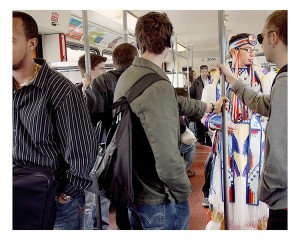 How have indigenous homelands been eroded by development and how have they endured? In what ways do Native people make urban places their own? Our program will explore the linkages between American cities and Native Americans, framing our discussion around themes of environmental and economic sustainability, social justice and education, and popular culture. Diverse concepts of “native” will be examined involving not only people but also native landscapes and species.
How have indigenous homelands been eroded by development and how have they endured? In what ways do Native people make urban places their own? Our program will explore the linkages between American cities and Native Americans, framing our discussion around themes of environmental and economic sustainability, social justice and education, and popular culture. Diverse concepts of “native” will be examined involving not only people but also native landscapes and species.
We will consider the perceptions, realities, and shared experiences of Nati ve, non-Native, and recent immigrants in American cities, using the lens of history, urban studies, public policy and cultural studies. We will look at alliances in areas such as environmental restoration projects, contemporary art, economic development and local governance.
ve, non-Native, and recent immigrants in American cities, using the lens of history, urban studies, public policy and cultural studies. We will look at alliances in areas such as environmental restoration projects, contemporary art, economic development and local governance.
During the fall and winter quarters we will examine the forces that formed the cities of Seattle, Chicago and New York – and how Native life and landscapes changed as a result. Attention will be paid to both immediately apparent and curiously intertwined events and periods in history, such as Native displacement, industrialization, World’s Fairs, the rise of urban planning, tourism, and the arts. Changes in the political life of Native groups will be addressed through a study of legislation and legal cases, tribal casinos, land development, environmental justice, and contemporary art. We will question how Native people are portrayed in museum environments, case studies, films, and texts.
From mid-winter to mid-spring, the program will continue to deepen its exploration of these issues. Students will engage in their own qualitative work by utilizing case study methodology to carry out a project on an urban area of their choice. Workshops will develop skills in GIS (Geographic Information Systems), demographic analysis using the U.S. census, community development, policy research, film critique, interviewing and oral history. Students will use these skills to become stronger writers and researchers, and importantly, community members. We will require extensive reading and writing on these topics and students will assist in the facilitation of weekly seminars. Guest presenters, documentary films, museum exhibits, and field trips to tribal museums and urban community organizations will support our analysis throughout the year.
One Comment
Hello